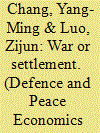| Srl | Item |
| 1 |
ID:
147410


|
|
|
|
|
| Summary/Abstract |
This paper studies the inter-correlation among the Communist Party of China (CPC), unionization, and social insurance in a sample of Chinese private firms. We find that both Party branch and unionization are positively associated with insurance coverage. We further present evidence that Party branch and unionization are complements in association with better coverage of social insurance. When the Party–union complementarity is taken into account, Party branch alone is no longer positively associated with social insurance, while the correlation between unionization and insurance declines significantly. Our results suggest that the role of the CPC is overlooked in the literature on labor relations in China.
|
|
|
|
|
|
|
|
|
|
|
|
|
|
|
|
| 2 |
ID:
117689


|
|
|
|
|
| Publication |
2013.
|
| Summary/Abstract |
This paper presents an economic analysis of the optimal choice between war and settlement when armed conflicts involve weapon costs and endogenously increasing destruction to consumable resources. In contrast to some earlier findings in the conflict literature, we derive conditions under which war dominates settlement as the Nash equilibrium choice in a one-period game without incomplete information or misconceptions. These conditions are shown to depend not only on resources allocated to the production of military weapons, but also on the endogenous destructiveness of weapons used in warfare. We show that contending parties always allocate more resources to arms productions under settlement (in the shadow of conflict) than under war. When total destruction is less than the difference in arms productions between settlement and war, each party's expected payoff is relatively higher under war. As a result, war dominates settlement. But, when total destruction is greater than the difference in arms productions between settlement and war, each party's expected payoff is relatively higher under settlement. In this case, settlement dominates war and the larger scale of destructiveness associated with higher arms levels generates an effective deterrence for 'armed peace'. One implication of the positive analysis is that, under the threat of conflict, arms reductions for promoting peace can never be voluntary.
|
|
|
|
|
|
|
|
|
|
|
|
|
|
|
|